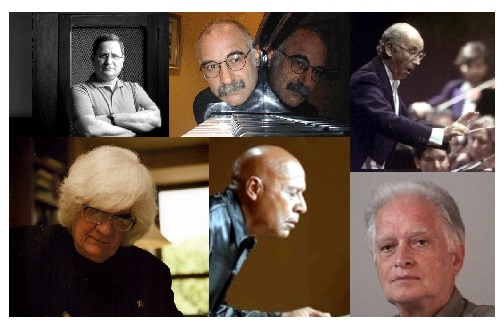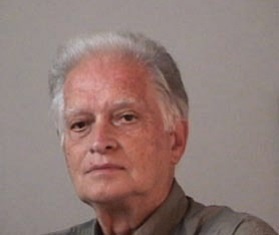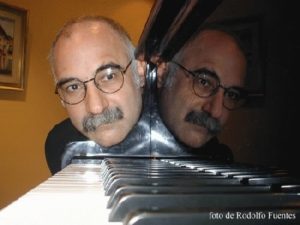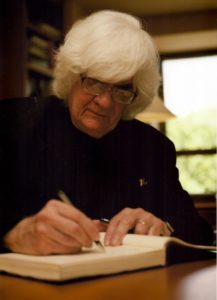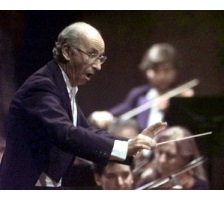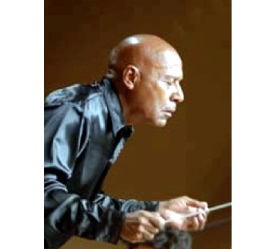9th World Symposium on Choral Music, Puerto Madryn, Patagonia, Argentina, 3-10 Aug 2011
Six well known composers from Latin America will premier their new creations, commissioned by WSCM9. Chosen for their interesting styles the featured composers hail from Argentina, Uruguay, Venezuela, Brazil and Cuba. The Argentine Maestro Oscar Escalada will be the presenter of every Composer conference. In addition, many of the invited choirs will bring new compositions to their concert programs, enriching the choral literature.
 César Alejandro Carrillo, Venezuela.
César Alejandro Carrillo, Venezuela.
Composer, arranger and choir conductor. He studied Composition with Modesta Bor and Choral Conduction with Alberto Grau and Michel Eustache. He graduated from Conservatorio de la Orquesta Nacional Juvenil (1987) as Choral conductor with a degree in Music (1997); he graduated with honours (Cum Laude) in Choral conducting from Instituto Universitario de Estudios Musicales. He has given concerts several times in Europe, Asia and America. He has received many prizes in choral competitions and has participated as juror and lecturer in different national and International events. He was appointed to present his atelier of Caribbean Popular Music at América Cantat III (Caracas, 2000). One of the most important composers and arrangers of choral music in Venezuela, his work has received awards more than 20 times. Santa Barbara Music Publishing and Earthsongs publish his music for the international market. He is the author of the book “Música Sacra – Guía de textos latinos traducidos al español”, published by Lulu.com, 2008. He teaches at the university level. He currently conducts the Orfeón Universitario de la UCV, Cantarte and Coral Antiphona and is a founding member and arranger of Bolanegra, a vocal ensemble dedicated to popular music.
Composer, teacher and musical researcher. Musical director of the Recoleta Center, Buenos Aires. President of the Argentine Federation of Electroacoustic Music from 1998 to 2006 and board member of the International Confederation of Electroacoustic Music (ICEM-UNESCO). Occupied the chair of the Musical Morphology Studies within the Philosophy School, National University Bs. As.(UNBA). where he taught from 1986 to 1997. He founded the first Institutional Lab of Electroacoustic Music in Latin America at the UNBA (1958). He was given the Guggenheim Scholarship in 1977 and the National and Municipal awards in composition in the ´90s. Distinguished with the “Magistere” for his pioneering work in E.M. by the International Institute of E. M. of Bourges (IMEB). Main researcher in the exchange program with Stanford University, California, USA, related to computer music composition. He has given courses and lectures in composition and musical analysis in several European and American countries for the last 40 years. His instrumental and electroacoustic music have been performed worldwide. Articles and papers of his on different musical subjects have appeared in many specialized publications.
Leo Maslíah was born in Montevideo, Uruguay, in 1954. He studied music with Bertha Chadicov, Wilser Rossi, Nydia Pereyra Lisaso, Manuel Salsamendi, Coriún Aharonián and Graciela Paraskevaídis. He had his first public presentation in 1974 as an organist performing a solo concert of Haendel. Since 1978, he actively works as an author and performer of popular music with presentations in many countries of America and Europe. As composer and performer of the genre called “culto” he participated in concerts and records of contemporary music from Uruguay, Argentina and other countries. The Uruguayan orchestras have played many of his symphonic works. His chamber music is part of the repertoire of several national and international performers. In June 2003 his opera “Maldoror”, based on the book of Lautréamont, was premiered at Teatro Colón, Buenos Aires. He has recorded nearly 40 records as a soloist. “Árboles” won the Gardel Awards in 2008 (Argentina) for “best instrumental album”. Leo Masliah has also published nearly 40 books, among which are novels, compilations of stories and theatre plays. His work “Telecomedia” was awarded the National Prize of Literature of Uruguay in 2000.
Marlos Nobre was born in Recife in 1939. He studied music composition at Instituto Torcuato Di Tella in Buenos Aires with Maestros Ginastera, Messiaen, Malipiero and Dallapiccola. He has been awarded 25 international prizes of music composition such as the Prize UNESCO 1974 and Tomas Luis de Victoria 2006. He has written 240 works which have been recorded by the great orchestras, such as Orchestre de la Suisse Romande, the Royal Philharmonic of London, the Orchestre de Paris, and the Orchestre de l’Opéra de Nice. His music production is recorded on 57 CDs by Philips Phonogram, EMI, Angel and Deutsche Grammophon. He has been given more than 40 commissions from important institutions all over the world. He has been Director of the program “Concertos para a Juventude” at Rede O Globo; First Director at Instituto Nacional de Música da FUNARTE where he created projects to support Brazilian young instrument players and the National Contests of University Choirs, among others. In 1985, he was appointed President of the International Music Council of UNESCO. He is an Officer of Orders in France and Belgium, guest professor at universities in the USA, Belgium, Netherlands, and the University of Art in La Habana. He is a member of honor at the Contests “Rubinstein” in Israel, “Santander” in Spain, “Ginastera” in Switzerland and the Committee of Olympic Arts in Paris. The critics of International musicologists consider Marlos Nobre as the genuine expression of contemporary music of Brazil.
Antonio María Russo, Argentina.
Born in Italy in 1934 and Argentinean citizen since 1958, he has developed a long and successful career as choir conductor, orchestra conductor, pedagogue and composer. In 1981 he was invited as guest of honor to the city of London by the British Council for his premieres of English music. He was declared “Personalidad emérita de la Cultura Argentina” by the Secretary of Culture of the Nation in 1999. Recently, he received the prize Konex once more for his teaching work. Since 1992 he has intensified his work as composer. He has created pieces for piano, a cappella choir, choir and orchestra, orchestra, chamber ensembles, and symphonic orchestra which have been performed in important theatres of Argentina and the world. In 1998 he premiered a “Misa de Corpus Christi” for soloists, choir and orchestra, commissioned by the Vicaría de Buenos Aires, which has been highly praised and was premiered in Europe in 2000. His “Pasión según San Juan”, was awarded by the Association of Music Critics of Argentina as the best Argentinean work premiered during the year 2002. He has also received praise from this association for his career in 1997, “Best Orchestra Conductor” in 2003 and 2007, and “Hechos positivos de mayor trascendencia cultural” in 2005. On December 2009, he conducted the first world performance of his oratory Jephte Galaadites, based on the biblical text, for choir, soloist, piano and percussion.
Roberto Valera, La Habana 21-12-1938. National Prize of Music 2006. Studies: Conservatory Amadeo Roldán, post-grades of Music Composition and Orchestra Conducting at Frederic Chopin School, Warsaw. Graduate from Escuela Normal para Maestros. Doctor in Pedagogy at the University of La Habana. Doctor in Arts and Advisor Professor at the Instituto Superior de Arte. He studied singing and dramatic acting, receiving in 1958 the Prize Alcaldía for graduates. First Prize at the National Competition of Composition 1989. Annual Prize of Acknowledgement UNEAC 1989. He has received the Order Félix Varela of First Grade, Medal Alejo Carpentier, Distinctions “For National Culture” and “For Cuban Education”, Machete de Máximo Gómez, Medal José María Heredia, Key of Santiago de Cuba, Medal Karol Szymanowski from Poland, Medal of Basse Terre, Guadalupe, and others. In 2008, his work Non Divisi was nominated for the Latin Grammy Awards in the category Best Work/Composition Contemporary Classic.
English text revised by Philip Brunelle

